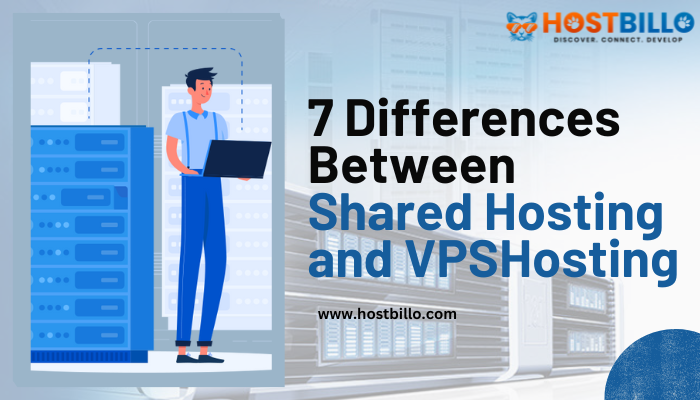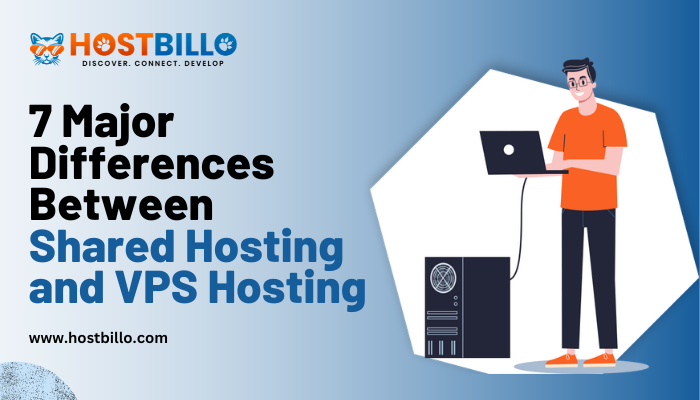7 Differences Between Shared Hosting and VPS Hosting

Introduction
Learning about various web hosting services is essential for growing your online presence. Primarily, website hosting is essential to keep your site fully operational. There are currently two major web hosting options on the market. The most well-liked options are VPS Hosting and shared hosting. This post will assist you in better understanding the appropriate web hosting service for your requirements. We will also emphasize the primary qualities that set them apart.
Creating a website is getting easier than ever, yet it is still critical that you understand the basic frameworks. This in-depth overview of the concepts of major web hosting services is created to demonstrate how each option works and to highlight what beginners should realize before getting started. Let’s start by outlining the performance, and then we’ll look at which option is perfect for you.
Overview of Shared and VPS Hosting

Shared Hosting
Shared hosting is the process by which a web host oversees a large number of websites on a single server. It is the most cost-effective hosting option because the costs get shared among multiple clients of the same server. A shared hosting option is a perfect alternative if you want to start a blog or a new business. Traditionally, sharing a server raised worries about increasing traffic and resource usage from a single website slowing down nearby websites. On the other hand, today’s hosting provider plans feature a variety of resources that provide maximum performance.
Virtual Private Server hosting
The term VPS refers to a virtual private server. Having some similarities to shared hosting, every VPS user will have its segment of guaranteed dedicated resources. It typically costs money to get more computer power, storage capacity, and memory. But with VPS hosting servers you will benefit from sophisticated server management and features. Users who own a virtual private server gain root access to their section and can change the server software. This covers Windows Server, CentOS, or Ubuntu.
When executing web programs developed for all of those platforms, provides a significant degree of freedom. Keep in mind that support levels, payment details, and trends change, so do your analysis before signing in to one of these services. However, VPS hosting remains the most popular option because it is both cost-effective and beneficial to growth. Several website owners with a reasonable traffic ratio select VPS because it provides dedicated resources at a lesser cost.
7 Major Differences Between Shared Hosting and VPS Hosting

Performance
Internet users want sites to load in seconds or less, and people can leave if it ends up taking more than 3 seconds. As a result, selecting the best hosting plan is a key company decision. An SSD VPS hosting plan will almost always be quicker than a shared hosting solution because your users will not have to wait in line with some other sites’ visitors to reach yours.
VPS hosting provides additional computing resources and processing capabilities, which improves the speed of most websites and boosts the chance of a conversion. When your website is modest, a shared hosting service will most likely be enough. Yet, if your website is huge or depended on for company and revenue growth, you will need an advanced option like VPS.
Reliability and Stability
Any website’s uptime is critical since it defines whether your web presence will be open and usable to guests whenever they visit. It is extremely important for professional exhibitions, commercial websites, and online shops. Network issues can occur in both shared or VPS hosting services. Much of this gets determined by the reliability of the server software and hardware in addition to the skills, support, and management practices of the provider.
Yet, since there are fewer clients on each server, you should anticipate fewer troubles with a VPS service. Each segment can get configured and customized to the best conditions for the needs of a certain website or application, and each VPS is often more reliable and secure. When using shared hosting, there’s the concern that the server will get overcrowded. While a VPS is hosted in its own surroundings, you don’t have to worry about other clients impacting your site’s accessibility. You should select a provider that provides high availability with highly stable, robust, and scalable infrastructure.
Security
When there are more websites and chances for attackers in shared hosting, there is often a higher risk of security breaches. Also, shared hosting users are typically the least informed about web hosting measures, which means that server weaknesses could get triggered by your hosting neighbors.
Other websites using the same platform may experience issues if one of the clients who share the server becomes compromised. VPS is advantageous for organizations that handle a vast amount of consumer data or payment information. This option provides sophisticated security measures that are often maintained by experienced specialists, so you have very little to worry about when it comes to protecting important data. Further, SSL certificates provide secure encryption of essential sensitive data.
Price
VPS is often more expensive than shared hosting that’s because the expense of shared hosting gets divided among the many clients of the shared server. Cheap VPS hosting has more resources and is more reliable, therefore it is often more expensive.
The most economical option in terms of price is a shared hosting service. VPS hosting options include additional premium features such as better performance and internet business customizations. VPS hosting plans are present in a range of storage or RAM combinations. So it is better to establish your preferred pricing structure and the features you require to determine the degree of service required for your website.
Managed Services
Shared servers are often managed, this indicates that skilled staff members of the hosting company will make sure the servers are regularly updated and protected. Shared hosting professionals help with duties such as transfers, backups, monitoring, upgrades, and maintenance, as per managed services.
A virtual private server is available in both managed and unmanaged services. For instance, the client is in charge of installing and maintaining software installs and configurations in an unmanaged platform. When you choose a VPS Hosting server, you could expect greater features and support when you choose a managed plan. The decision between managed and unmanaged VPS get based on how much attention you want to invest in managing the quality and performance of your website, in addition to your technical skills.
So, if you lack technical abilities, consider getting managed VPS hosting to ensure that you will receive high-quality support from the 24/7 technical team to assess and handle performance and security concerns.
Scalability
Scalability is the ability of a hosting service to expand as your website progresses. This is typically the key factor when choosing between shared vs VPS hosting. Scalability has multiple components, like storage and server capability.
A shared server will be able to accommodate that level of traffic if you have an average modest visitor ratio per month. However, if your website expands and grows, a shared hosting package could not be able to keep up. Shared servers have limited ability to cope with rising workloads, whereas VPS hosting plans offer virtually limitless possibilities in this department.
It’s common for resources to be upgraded in response to shifting traffic patterns; for instance, e-commerce platforms will probably need more bandwidth to handle the workload. A VPS hosting plan is usually a good expenditure if you anticipate adding a lot of extra content and traffic.
Several website owners will begin with a minimal shared hosting plan and later upgrade to a VPS subscription. But if you notice major growth, you might want to begin with a Virtual private server. There is no other choice but to update your package if user demand begins to overwhelm server capacity.
Customizations
When installing software to features and functions of your website, you might regularly want more decision-making power. When it comes to customizing and installing programs on a VPS Hosting, there are often fewer constraints on what you get allowed and cannot do. Your accessibility won’t be the same with a shared server. Although the possibilities for configuration are limitless, you don’t want to abuse it and destroy or erase data or programs by accident. Just adjust what your site needs.
Which is a Better Option Between Shared and VPS Hosting?
When it is time to decide which hosting solution is suitable for you, we recommend VPS hosting. Given its high accessibility and multiple rewards, VPS is becoming an increasingly popular option.
When you initially launch your website, although, a shared server is appropriate. Yet, after a little while, we will recommend changing to a VPS h. Because of its dedicated resources and high rate of protection against potential online threats, the best VPS hosting service is more protected and reliable.
Similarly, when selecting the Best VPS hosting, collaborating with a trustworthy hosting provider is just as essential as selecting the best hosting choice. Whatever hosting service you select, be certain you work with the top hosting company. According to the collected data, choosing Hostbillo’s Cheap VPS Hosting for your website can save you money while still offering good service. The Best VPS server, in particular, presents you with unique system resources that might be incredibly beneficial.
Conclusion
The choice of where and how to host a brand-new website requires careful consideration. Signing up for a Web hosting Company is the fundamental step in building an online presence, whether for an internet corporation, a blog, or some other type of website.
Understanding the fundamentals of web hosting as well as the many types of hosting services can assist you in selecting a low-cost, trustworthy web hosting provider for your website. Analyze your objectives when evaluating alternative options and hosting providers, and compare the benefits and downsides of various web hosting companies. You can choose a VPS server hosting in line with your needs. It could offer you more control over your resources as well as the hosting environment. You will also have total root access and control over your assets.




